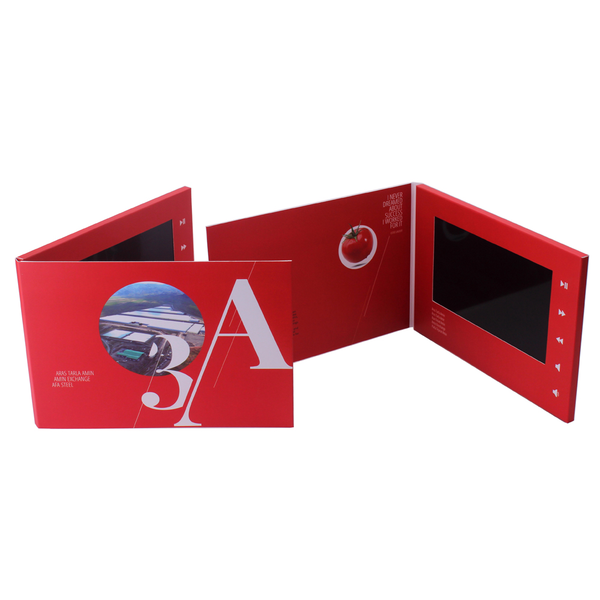Video in print[^1] is revolutionizing how brands communicate with their audiences. Traditional print materials struggle to capture attention, but integrating video transforms static content into an engaging, memorable experience.
Video in print[^1] combines digital screens with traditional print, creating a unique marketing tool that engages viewers through motion, sound, and interactivity. It enhances storytelling and brand recall.

With businesses constantly seeking new ways to stand out, video in print offers an innovative solution. Let’s explore how it works, its benefits, and why industries are adopting this technology.
What is Video in Print?
Video marketing is booming, but digital fatigue is real. People are overwhelmed with online content. Video in print[^1] breaks through the noise, blending physical and digital experiences.
Video in print[^1] integrates a small LCD screen into printed materials, allowing brands to deliver high-impact video content[^2] within brochures, books, and packaging.

The Technology Behind Video in Print
| Component | Function |
|---|---|
| LCD Screen | Displays video content |
| Rechargeable Battery | Powers the video module |
| Speaker | Enhances engagement with audio |
| Control Buttons | Allows user interaction |
| USB Port | Enables content updates |
By combining these elements, video in print brings a dynamic, interactive dimension to traditional marketing materials.
How Does Video in Print Work?
Marketers need engaging ways to tell stories. Video in print[^1] delivers a tangible, interactive experience, making it easier to retain audience attention.
A motion sensor, button press, or page flip activates the embedded screen, playing a preloaded video message that educates or promotes a brand.

Step-by-Step Process
- Design the Print Material – Customize brochures, books, or packaging with a dedicated video section.
- Embed the Video Module – Insert an LCD screen, speaker, and control buttons.
- Load the Video Content – Upload high-quality video content via USB.
- Activate on Interaction – Users trigger playback through motion sensors or button presses.
This seamless process ensures users receive a premium, high-impact marketing experience.
Benefits of Using Video in Print for Marketing?
Traditional brochures often end up discarded. Video in print[^1] ensures audiences engage longer and remember the message.
Video in print[^1] increases engagement, enhances brand recall, and creates an emotional connection[^3] with the audience, making marketing materials more impactful.

Key Advantages
| Benefit | Description |
|---|---|
| High Engagement | Video keeps viewers captivated |
| Better Retention | Visuals and sound improve recall |
| Emotional Impact | Storytelling enhances connection |
| Measurable Results | Track interactions and responses |
| Competitive Edge | Differentiates brands from competitors |
Brands using video in print report increased conversions, longer interaction times, and a stronger emotional impact compared to standard print materials.
Industries That Benefit from Video in Print?
Not every industry benefits equally from print marketing. Some require higher engagement to convey their message effectively.
Industries like real estate, luxury brands, and healthcare use video in print to create immersive experiences that inform and persuade their audiences.

Top Industries Leveraging Video in Print
- Real Estate – Property listings come to life with video walkthroughs.
- Luxury Brands – Showcasing craftsmanship and exclusivity through high-end marketing.
- Healthcare – Explaining complex procedures or introducing new medical devices.
- Education – Enhancing learning materials with interactive content.
- Retail & E-commerce – Creating product catalogs that demonstrate features dynamically.
How to Create an Effective Video in Print Campaign?
A poorly executed campaign wastes resources. To maximize ROI, brands must strategize content, design, and distribution.
Start with a clear objective, craft compelling video content, and ensure seamless integration between print and digital elements to maximize impact.

Best Practices
| Step | Action |
|---|---|
| Define Goal | Identify the marketing objective |
| Choose Content | Create engaging and relevant video |
| Optimize Design | Ensure print and video elements blend well |
| Test & Iterate | Gather feedback and refine the campaign |
| Measure Impact | Track engagement and conversions |
With a well-planned approach, video in print can become a powerful tool in any brand’s marketing arsenal.
Conclusion
Video in print[^1] bridges the gap between traditional and digital marketing, offering brands an innovative way to engage audiences and drive results. As technology advances, its adoption will only continue to grow.
---
[^1]: Explore the transformative benefits of Video in print technology for marketing and audience engagement.
[^2]: Learn how to create high-impact video content that captivates audiences and enhances marketing efforts.
[^3]: Discover why establishing an emotional connection with your audience is crucial for effective marketing strategies.

